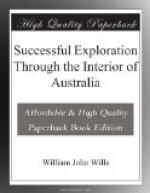The party at once got into motion. Following the leader were several pack horses, led by some of the assistants on foot. Then came Mr. Landells, on a camel, next Dr. Becker, similarly mounted, and these were succeeded by two European assistants, riding on camels—one leading the ambulance camel, and the other leading two animals loaded with provisions. Sepoys on foot led the remainder of the camels, four and five in hand, variously loaded, and the caravan was closed by one mounted sepoy. Altogether twenty-seven camels go with the expedition. Two new waggons, heavily loaded, followed at a good distance. These were built expressly for the expedition, and one of them is so constructed, that at a very short notice it can be taken off the wheels, and put to all the uses of a river punt, carrying an immense load high and dry on the water. If it be necessary to swim the camels, air bags are provided to be lashed under their jowls, so as to keep their heads clear when crossing deep streams. Two or three hired waggons and one of the new ones, were detained in the park till nearly dusk, in charge of the astronomer, Mr. W.J. Wills, and the foreman, who had to look to the careful packing of instruments, specimen cases, etc. The hired waggons will proceed as far as Swan Hill only. Issuing from the south gate of the park, the party went down behind the manure depot, and thence on to the Sydney road, and the whole camped last night near the village of Essendon.
. . .
The first day’s march scarcely exceeded seven miles, the camping ground for the night being on an open space of greensward near the church at Essendon. Here I saw my son for the last time. It was with a feeling of great misgiving that I took leave of him. On shaking hands with Mr. Burke, I said frankly, “If it were in my power, I would even now prevent his going.” I then added, “If he knew what I am about to say, he would not, I think, be well pleased; but if you ever happen to want my son’s advice or opinion, you must ask it, for he will not offer it unasked. No matter what course you may adopt, he will follow without remonstrance or murmur.” Mr. Burke shook me warmly by the hand in return, and replied: “There is nothing you can say will raise him higher in my estimation than he stands at present; I will do as you desire.” There were some photographers present to take likenesses. My son refused to be taken. “Should it ever be worth while,” he said, “my father has an excellent one, which you can copy from.” Alas! it has been copied very often since.
The progress of the party was slow through the enclosed districts, until they reached Swan Hill on the Murray, which, properly speaking, is the northern boundary of the colony of Victoria. My son’s first letter was dated August 26th.
My dear father,




